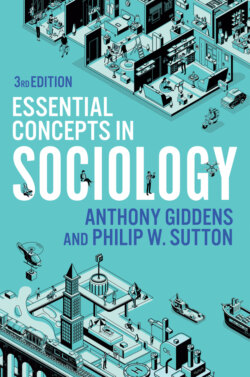Читать книгу Essential Concepts in Sociology - Anthony Giddens - Страница 69
Critical Points
ОглавлениеThe theory of reflexive modernization and the heightened individualization that is assumed by it is open to criticism on empirical grounds. While some of the social changes described by the theory are indisputable – the diversification of family life, shifting marriage and divorce rates, for example – the idea that the industrial society has given way to a new form of reflexive modernity is contentious. Has handling risk really become the new organizing principle of contemporary societies? Industrial production processes are now global in scope, with most manufacturing taking place in the developing countries, and it can be argued that industrial capitalism remains the best characterization of societies today. The thesis of individualization and enhanced reflexivity can also be exaggerated. Though people may not consciously identify with social class, for instance, in quite the same way that they did in the first half of the twentieth century, it does not follow that their lives and life chances are no longer shaped by class position. Indeed, there has been a backlash against the individualization thesis as sociologists have shown the continuing salience of class.
The adoption of reflexivity in sociological research has also had a mixed reception. For some, the rush to include the researcher’s own biography within the research process can all too easily tip over into self-indulgence and an irrelevant listing of personal details. In addition, a focus on reflexivity can lead into a neverending process of reflecting on reflection and interpretation layered on interpretation, which risks paralysing researchers who get caught up in their own practice at the expense of what many consider to be the real task of sociology, namely to produce valid and reliable knowledge of social life in order better to understand and explain it. It is also unclear how reflexive research practice could apply to the large-scale social and attitude surveys that are still necessary if we are to uncover the patterns and regularities that form the basis of societies.
